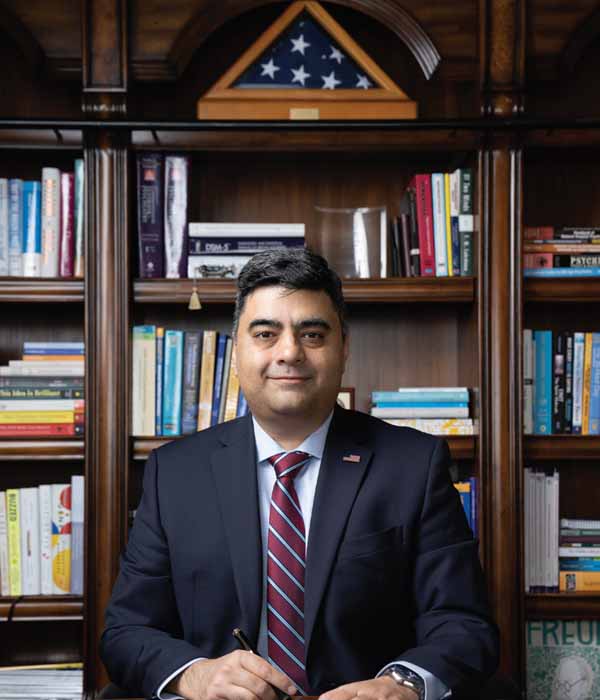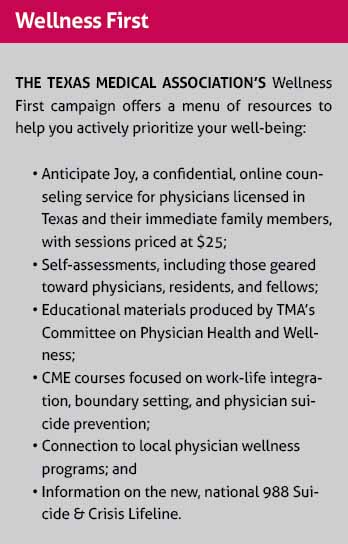
Galvanized by the Texas Medical Association’s response during the early months of the COVID-19 pandemic, Frisco psychiatrist Umar Latif, MD, first became involved in organized medicine when he began volunteering for the Dallas County Medical Society’s Physician Wellness Committee, which helps physicians recovering from mental health crises.
But this recent role belies his long career as an advocate for physicians and other frontline workers.
During his 18 years in practice, Dr. Latif has developed an expertise in suicide prevention and treatment, especially among active-duty military personnel and veterans.
He says the pandemic laid bare the parallels between the military community and health care professionals when it comes to mental health concerns, including moral injury.
Veterans Affairs psychologist Jonathan Shay and colleagues coined the term “moral injury” in the 1990s to describe the distress some veterans experienced when actions they had taken during their military service conflicted with their own moral beliefs.
Given his background, Dr. Latif is concerned about the stakes of not addressing moral injury among physicians. “It’s a zero-sum dilemma,” he told Texas Medicine. “If we don’t help our physicians heal and restore their sense of why, their sense of calling, we won’t be effectively able to deliver high-quality care to our patients.”
Fortunately, Dr. Latif says, TMA and others in organized medicine have prioritized physician wellness and mounted a systemic response to moral injury among health care professionals. (See “Wellness First,” page 48.)
“There’s a very important need in physician advocacy to speak up ... because otherwise doing more yoga to prevent burnout when the whole house is on fire really isn’t a good solution.”

A call to service
Dr. Latif comes from a family of physicians, and he spent his childhood trailing his father – a U.K.-trained army psychiatrist in Pakistan – on house calls.
He recalls seeing families in crisis, both as a young observer and within his own home, as his mother spent nearly a decade with “a very brittle cancer diagnosis.”
These experiences reinforced that medicine was a higher calling and psychiatry was his own chance to offer patients and their families empathetic, compassionate care.
“There’s almost a sanctity to the patient-physician relationship that leaves a deep imprint, not only on the physician but on their family members,” Dr. Latif said.
He attended Allama Iqbal Medical College in Lahore, Pakistan, before moving to Detroit for his psychiatry residency. In Dallas, he completed a fellowship in geriatric psychiatry at UT Southwestern Medical Center.
Much of his career has revolved around treating active-duty military personnel and veterans for what he describes as “invisible wounds of the war,” including post-traumatic stress disorder (PTSD), and improving access to culturally competent care.
While working at the Dallas VA Medical Center in the mid-2000s, Dr. Latif realized there was a need for civilian psychiatrists who were trained in the unique needs of the military and military-connected communities. So, in collaboration with colleagues at Fort Hood, he co-founded the Freedom Care Military Program, an inpatient psychiatric program in Denton specializing in PTSD, substance use, and suicide prevention treatment.
After a decade as its medical director, Dr. Latif and his team co-founded the national Help for Heroes program, which provides specialized mental health and substance use treatment to military service members, veterans, and first responders. It now operates at eight treatment facilities across six states, including Texas.
As the program grew, Dr. Latif sought leadership development opportunities, earning an executive health care leadership certificate through Cornell University. In 2021, he was selected as a George W. Bush Institute Stand-To Veteran Leadership Program scholar. The initiative targets leaders from a wide range of sectors who are working to improve veteran outcomes.
The Stand-To Veteran Leadership Program also introduced him to a classmate, Tina Atherall, who is the chief executive officer of PsychArmor, a nonprofit that trains civilians in military cultural competency. Dr. Latif now serves on the PsychArmor board.
“All these roles are interwoven, making an impact in improving clinical outcomes by delivering high-quality care,” he said.
Drawing connections
The pandemic brought with it an awareness of the occupational hazards facing physicians and other health care professionals dealing with burnout, and Dr. Latif soon realized his work with the military-connected community mapped onto this new crisis on the home front.
During COVID, “there were a lot of parallels with physicians using the same language that we had witnessed [in] patients who had suffered chronic stress, chronic trauma over years and years, and they were losing hope,” he said. “They were internalizing a lot of things that were systemic.”
Dr. Latif stresses the distinction between burnout, an individual issue, and moral injury, which is systemic. Not addressing the latter, he fears, could lead to cataclysmic consequences for the medical profession, including worsening physician workforce shortages, patient outcomes, and health care costs.
For instance, a March 2022 report by Elsevier found nearly half – 47% – of U.S. clinician respondents were planning to leave their current role within the next two or three years, citing a constellation of factors, including a lack of work-life balance, feeling underappreciated, and the changing nature of their jobs.
Another study, published in the April 2022 issue of Mayo Clinic Proceedings, found primary care physician turnover accounted for nearly $1 billion in excess health care spending in the U.S., with nearly a third of that cost attributable to physician burnout.
Dr. Latif also worries about the human cost of burnout and moral injury, such as heightened risk of suicide and substance use among physicians. He cites New York City emergency physician Lorna Breen, MD, whose death by suicide in April 2020 spotlighted the reasons some physicians choose not to access mental health care, including fear that doing so will jeopardize their medical license. She died after a three-week period in which she cared for COVID-19 patients at the height of the first surge, contracted the disease, and returned to an overwhelmed hospital.
But he is hopeful, too, given the reach TMA has among Texas physicians and its track record for responding to on-the-ground concerns, such as a lack of personal protective equipment during the early days of the pandemic or the erosion of physician autonomy by state and federal lawmakers.
“[TMA] can provide a platform where a lot of us can bring a diversity of experience, a diversity of input, coming together to find solutions so that we can execute on them in real time,” he said.
Well aware of this, Dr. Latif is working to further develop his own leadership skills. He participated in TMA’s inaugural Leadership Summit last December. He also enrolled in a postgraduate certificate program – Effective Writing for Health Care – at Harvard Medical School, where he’s learning how to engage the public on health care topics, including physician wellness, burnout, and moral injury.
Many patients, he notes, are unaware of the challenges physicians face. That gulf has been exacerbated by mis- and disinformation in recent years, sowing distrust of health care professionals and adding to their burden.
“Oftentimes physicians become the face of a system that the physician doesn’t have agency or control over,” Dr. Latif said. “Is it the seed or is it the soil that’s the problem? Regardless, in the end, who heals the healers if not us?